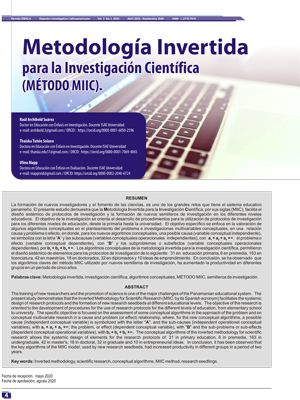Metodología Invertida para la Investigación Científica (MÉTODO MIIC).
The training of new researchers and the promotion of science is one of the major challenges of the Panamanian educational system. The present study demonstrates that the Inverted Methodology for Scientific Research (MIIC, by its Spanish acronym) facilitates the systemic design of research protocols and the formation of new research seedbeds at different educational levels. The objective of the research is oriented to the development of procedures for the use of research protocols for the different levels of education, from elementary school to university.
Keywords:
Inverted methodology, scientific research, conceptual algorithms, MIIC method, research seedlings.Abstract
- Fecha de recepción, mayo 2020
- Fecha de aprobación, agosto 2020
- Páginas: 8
The specific objective is focused on the assessment of some conceptual algorithms in the approach of the problem and on conceptual multivariate research in a cause and problem (or effect) relationship, where, for the new conceptual algorithms, a possible cause (independent conceptual variable) is symbolized with the letter "A", and the sub-causes (independent operational conceptual variables), with a1 + a2 + a3 + ; the problem, or effect (dependent conceptual variable), with "B" and the sub-problems or sub-effects (dependent conceptual operational variables), with b1 + b2 + b3 + . The conceptual algorithms of the inverted methodology for scientific research allows the systemic design of elements for the research protocols of: 31 in primary education, 6 in premedia, 163 in undergraduate, 42 in master's, 18 in doctoral, 32 in graduate and 10 in entrepreneurial ideas. In conclusion, it has been observed that the key algorithms of the MIIC model, used by new research seedbeds, had increased productivity in different groups in a period of two years.
Downloads






